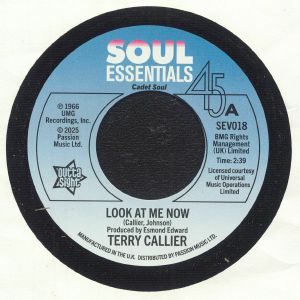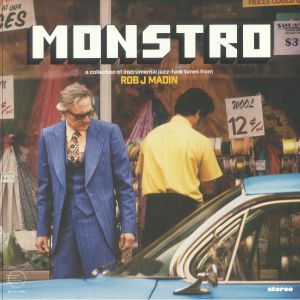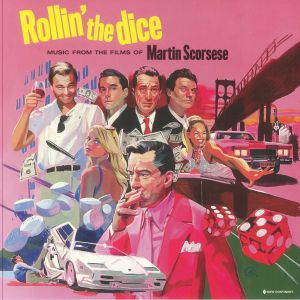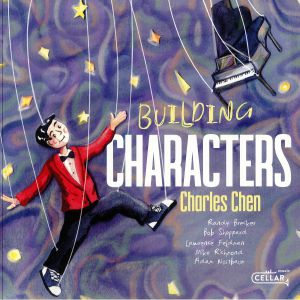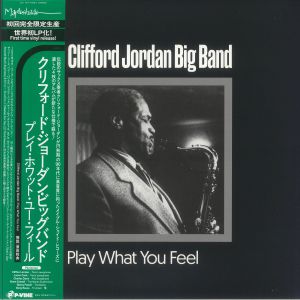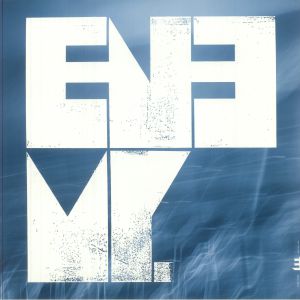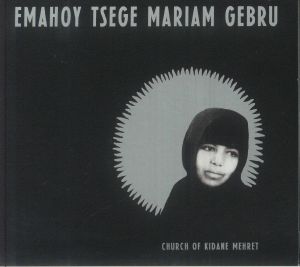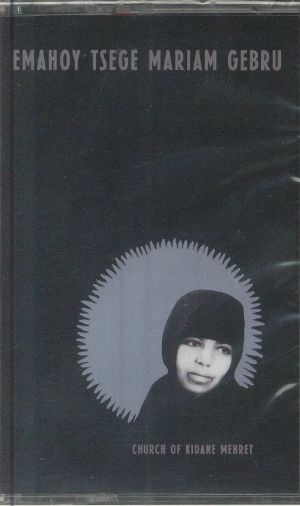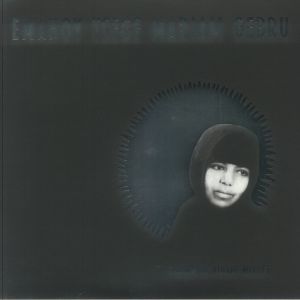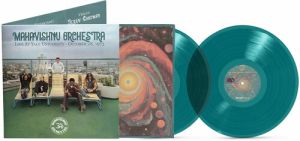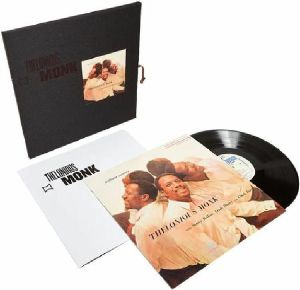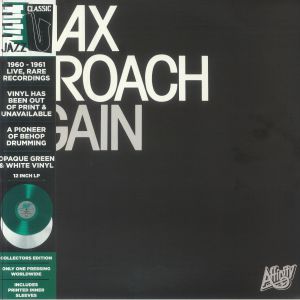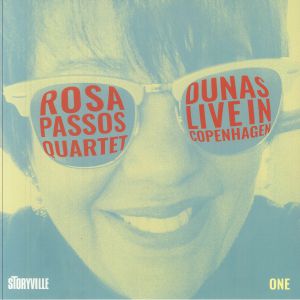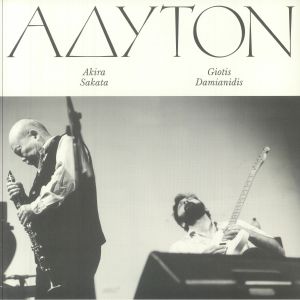Filter
Stock
Artist
Featured
Release Title
Price
Tags
Back catalogue: Jazz
Juno's full catalogue of Jazz
Singles
Review: After a wild shelf-clearer came by way of a reissue of 'Ordinary Joe' earlier this year, we've now a second Outta Sight reissue of yet another gladly intoned Terry Callier deep cut on our hands. Born and raised in Chicago's Cabrini-Green, Callier came up alongside a generation of soul and jazz innovators but always stood apart. After his debut LP The New Folk Sound fell into obscurity, and his 1968 Cadet single 'Look At Me Now' slipped past unnoticed, he was brought into his mentor Jerry Butler's Songwriters Workshop, a game-changing move. This stirring early statement works in much inner commentary on manhood, stage fright and vital moment seizure - "now my people think I just fake it / I know I do things they don't understand / so I've got to show them I can take it / I've got to show 'em I can be a man" - aches with the strain of double consciousness in a performance society.
… Read more in stock ₺614,89
Review: Continuing their mission to retrouve genres across the spectrums of Latin funk and cumbia, Original Gravity welcome back founding favourites Luchito and Nestor Alvarez with yet another sonic vitamin D pill, presaging the warmer days to soon come. Both sides tap into that rich 60s and 70s Afro-Carib crossover sound, with, at least on the face of it, no studio trickery in earshot (though careful listens reveal the method behind the majesty). Anyone with a weakness for brass-led Latin burner will melt on contact with this one.
… Read moreIntérprete: Craig Charles Funk And Soul
in stock ₺494,65
Review: Best known to many as Brett Domino from 8 Out of 10 Cats Does Countdown and all round internet keytar cover verion fame, Rob J Madin steps out from his comedy roots with a fresh suite of instrumental jazz-funk recorded mostly in his Sheffield attic. Drawing from the energy of artists like BadBadNotGood and Mildlife, the new six-track EP blends silky keys, warped synths, and choppy drum samples into a head-nodding, sun-drenched mod soul anthem set. 'Callisto Disco' veers over brash momenta, while 'Cherryade' leans back towards a laid-back optimism, not to mention the opener 'Bouquet Garni', which prophesies restless singalong hums by the never-forgetting listener.
… Read more in stock ₺746,72
Review: UK mambo kinds Orchestra Mambo International share their second single for ATA Records, both on digital and vinyl formats once more. After a dazzling debut single for the label back in May 2024, 'Balia Mi Cha Cha' is a funky cha cha number driven forth by the songwriting of bandleader and trombonist Jonny Enright, backed up by vibraphone from John Settle and lead vocals from Venezuelan singer Carlos "Pachanga" PeNa. The B-side, meanwhile, is a mambo instrumental entitled 'Bajo Con Vibes' ('Bass With Vibes'), which riffs on the double metonymy of the word "vibes" and plays up to a fantastically warm bass sound, providing a proper aural rung onto which central part of the track the listener may latch themselves and become thus enthralled.
… Read more in stock ₺439,28
Álbumes
Rollin' The Dice: Music From The Films (limited 180 gram audiophile vinyl LP)
Cat: 843656 9195987. Rel: 22 May 25
in stock ₺681,33
Standards: Lost & Found 2 (Record Store Day RSD 2025) (gatefold 180 gram vinyl 2xLP + booklet)
Cat: RRLP 1233481. Rel: 23 May 25
in stock ₺2.614,59
in stock ₺1.933,26
Don Blackman (limited numbered 180 gram audiophile red vinyl LP)
Cat: MOVLP 3639R. Rel: 20 May 25
Review: Don Blackman's 1982 self-titled debut is an underrated jazz-funk gem that fuses soul, funk and jazz-fusion into a sophisticated groove-laden journey that was produced by Dave Grusin and Larry Rosen for GRP Records. The album showcases Blackman's keyboard wizardry and soulful vocals across standout tracks like 'Heart's Desire' and 'Holding You Loving You.' With playful cuts like 'Yabba Dabba Doo,' it balances polish with joyful experimentation and though not a commercial hit, its influence has quietly grown and ir has been sampled by hip-hop greats and revered by collectors alike. This reissue reaffirms its status as a cult classic and a crucial slice of 80s funk.
… Read moreIntérprete: Pete Haigh
in stock ₺1.274,07
B-X0 NO-47A (remastered) (limited gatefold LP + insert)
Cat: BYG 529315. Rel: 19 May 25
in stock ₺956,08
in stock ₺1.109,54
Play What You Feel (reissue) (2xLP + insert with obi-strip)
Cat: PLP 7560/1. Rel: 23 May 25
Review: Clifford Jordan's dynamic live set At Condon's was originally recorded in 1990 and is now reissued on vinyl for the first time. The tenor saxophonist's deep, bluesy tone shines through in this 16-piece big band setting and it has been captured by Maple Shade Records' audiophile-grade production. The session features standout performances from jazz luminaries like Dizzy Reece, Benny Powell and Junior Cook with classics like Ellington's 'Don't Get Around Much Anymore,' Gillespie's 'I Waited for You' and Jordan's 'Third Avenue' all adding up to an album that is a thrilling document of late-era brilliance. Jordan was truly spiritual jazz innovator and one of the most expressive saxophonists of his time.
… Read more in stock ₺1.999,70
Coltrane Plays The Blues (remastered) (limited LP)
Cat: PRLP 0003. Rel: 23 May 25
in stock ₺956,08
Three Guitars (180 gram one-step vinyl LP)
Cat: EVLP 065BL. Rel: 22 May 25
in stock ₺1.593,12
The Musings Of Miles (Original Jazz Classics Series) (B-STOCK) (180 gram vinyl LP with obi-strip)
Cat: CR 00854 (B-STOCK). Rel: 01 Jan 90
B-STOCK: Creasing to corner of outer sleeve but otherwise in excellent condition
Review: ***B-STOCK: Creasing to corner of outer sleeve but otherwise in excellent condition***
This early gem - in fact, it was the maestro's first ever 12" record - shows a masterful command of space and melody, spotlighting a warm, muted trumpet tone alongside a pared-down ensemble. Without a saxophone, the spotlight remains squarely on the lead, providing ample room for expansive solos and lyrical interpretations. Anchored by a stellar rhythm section featuring a buoyant bassist, impeccable pianist and dynamic drummer, the performances exude a relaxed yet precise energy. Highlights include a fresh, distinctive take on the Dizzy Gillespie classic 'A Night in Tunisia', where the group reimagines the piece with effortless ingenuity. Original compositions add further depth, with a witty riposte to a well-known standard and a contemplative piece that lingers in the listener's mind. A transitional moment for one of the all time greats, hinting at the greatness to come all the way back in 1955.
… Read moreThis early gem - in fact, it was the maestro's first ever 12" record - shows a masterful command of space and melody, spotlighting a warm, muted trumpet tone alongside a pared-down ensemble. Without a saxophone, the spotlight remains squarely on the lead, providing ample room for expansive solos and lyrical interpretations. Anchored by a stellar rhythm section featuring a buoyant bassist, impeccable pianist and dynamic drummer, the performances exude a relaxed yet precise energy. Highlights include a fresh, distinctive take on the Dizzy Gillespie classic 'A Night in Tunisia', where the group reimagines the piece with effortless ingenuity. Original compositions add further depth, with a witty riposte to a well-known standard and a contemplative piece that lingers in the listener's mind. A transitional moment for one of the all time greats, hinting at the greatness to come all the way back in 1955.
in stock ₺1.472,36
Bitches Brew (UltraDisc One Step Pressing) (limited numbered 180 gram audiophile vinyl 2xLP)
Cat: MFSL33UD1S 039. Rel: 21 May 25
in stock ₺7.382,34
in stock ₺933,93
At Home (180 gram vinyl LP)
Cat: TTBY 250021. Rel: 21 May 25
in stock ₺1.581,52
Review: Recorded in collaboration with Nils Frahm at Berlin's Leiter Studio, Ganavya's fourth album is destined to carve its own path to recognition due to its unique quality. A follow-up to last year's acclaimed Daughter of a Temple, which drew praise from many music outlets, Nilam - probably best known her for her appearance alongside Sault at their recent live show - continues her journey into music as devotion, meditation and memory. Born in New York and raised in Tamil Nadu, she moves fluidly between traditions, channeling pilgrimage trails, harikatha storytelling and jazz improvisation into something uniquely her own. Her voice is unhurried, intimate and full of clarity, conjuring stillness even in motion. It's a sound that invites stillness but never feels static, where every breath carries the weight of generations and each silence says as much as her lyrics. The songs on Nilam feel distilled from years of lived experience, shaped by years of live performance as tracks like 'Sees Fire' blend Eastern tonalities with meditative jazz, fusing introspection with emotional firepower. The album traces the patterns of gratitude, loss and rootedness meanwhile anchoring the listener in a place beyond the physical. Rather than chase genre, ganavya reaches toward essence. Nilam isn't just an album, it's a moment held in reverence. A sonic altar where memory, spirit and sound meet. In her hands, song becomes a ritual of listening.
… Read more in stock ₺1.241,38
Review: Some 13 years have now passed since Mississippi Records started reissuing private press albums by Emahoy Tsege Mariam Gebru, an Ethiopian Orthodox nun, pianist and composer whose naturally religious-inspired works frequently took spiritual music to fascinating new places. Here the label turns its attention to 1972's Church of Kidane Mehret, notable not only for being recorded live in various churches across Jerusalem, but also for the use of harmonium and pipe organ as well as Emehoy's beloved piano. The original album, which in line with her other album features intricate and mood-enhancing solo translations of orthodox liturgies, has here been expanded via the inclusion of two further piano pieces from 1963's ultra-rare Der Sang Des Reeres - a set of which only 50 copies were ever produced.
… Read more in stock ₺538,42
in stock ₺571,12
Church Of Kidane Mehret (clear vinyl LP + booklet (indie exclusive))
Cat: MRI 214LPC1. Rel: 22 May 25
Review: Emahoy Tsege Mariam Gebru's deeply spiritual music has long remained a hidden gem and this release offers a rare chance to experience her most poignant works. Recorded in churches across Jerusalem, her performances on piano, harmonium and pipe organ transcend genre that blends Ethiopian Orthodox liturgy with the technical sophistication of her classical training. There's a serenity to these pieces, particularly in 'Ave Maria,' where her piano's crystalline chimes fill the sacred spaces, while 'Spring Ode - Meskerem' brings new life to familiar melodies, played through the rich drones of the harmonium. The collection moves from meditative to dramatic, with 'Essay on Mahlet' offering a slow, introspective journey as Emahoy translates the free verse of Orthodox liturgy into a delicate piano composition. The inclusion of 'The Storm' provides a moment of intense contrast, its stormy narrative unfolding through sharp, thunderous piano lines. Emahoy's ability to blend devotional themes with emotional depth is most apparent in 'Via Dolorosa,' where the music mirrors the weight of the stations of the cross with breathtaking gravity. Her music, though niche, stands out for its seamless fusion of Ethiopian spirituality with the grand traditions of Western classical music, feeling entirely distinct in its expression. The recordings, originally made in 1972, show a stark simplicity and restrained power that speaks directly to the soul. It's a rare treasure and an essential contribution to the world of spiritual music.
… Read more in stock ₺1.186,01
in stock ₺681,33
All Or Nothing At All (Acoustic Sounds Series) (gatefold 180 gram audiophile vinyl LP)
Cat: 758081 6. Rel: 22 May 25
Review: Billie Holiday's late career 1958 LP through Verve Records caught the legendary singer at a relatively intimate stage: substance abuse compounded financial difficulties, which imposed a toll on her already turbulent personal life, and Holiday's once-pure, all-powerful voice was showing signs of wear. A title like All Or Nothing At All would certainly seem to express the captive intensity of an industry that "breaks" artists in more ways than one, and despite the mixed reviews on release, this small combo-backed record is of one artist's broken but still functioning sensitivity. With Harry "Sweets" Edison and saxophonist Ben Webster, Holiday croons over 12 tracks, recorded over five sessions in 1956 and 1957, showcasing a more restrained vocal style that pierces clearly through and despite pharyngeal ills.
… Read more in stock ₺1.581,52
Linger Awhile (reissue) (limited blue vinyl LP)
Cat: VRV 1000124102. Rel: 01 Jan 90
in stock ₺1.384,29
Angel's Egg: Living In Water (Soundtrack) (CD with obi-strip)
Cat: TKCA 10556. Rel: 19 May 25
in stock ₺999,85
Luniwaz Live: The Music Of Joe Zawinul (gatefold 180 gram vinyl 2xLP)
Cat: WR 4824LP. Rel: 22 May 25
Review: Luniwaz LIVE is the sound of Scott Kinsey paying tribute to Joe Zawinul and Weather Report, not by basic imitation, but through fearless reinvention. The album was recorded live in Prague and brings Zawinul's spirit to life with raw energy and deep improvisation alongside Kinsey's seasoned rhythm section. As part of that, Hadrien Feraud and Gergo Borlai join forces with rising saxophonist Patrick Bartley Jr to blend jazz mastery with modern flair alongside guest appearances from Pedro Martins, Meredith Salimbeni and Bobby Thomas Jr, who further elevate the sound. Far from an exercise in nostalgia, this is a great reimagining of a jazz legacy.
… Read more in stock ₺1.219,76
in stock ₺856,94
in stock ₺2.450,06
Expansions (reissue) (gatefold 180 gram vinyl LP reeditado)
Cat: HIQLP 067. Rel: 20 May 25
Intérprete: Dave Lee ZR, Dynamite Cuts
in stock ₺988,78
Julie Is Her Name/Lonely Girl/Calendar Girl (gatefold orange vinyl 2xLP)
Cat: VPL 80755. Rel: 20 May 25
in stock ₺1.010,40
Live At Yale University: October 28 1973 (limited gatefold 180 gram translucent teal vinyl 2xLP)
Cat: RENA 90201. Rel: 21 May 25
in stock ₺1.483,43
in stock ₺571,12
Let Freedom Ring (reissue) (180 gram clear vinyl LP)
Cat: SRPD 0079CV. Rel: 19 May 25
in stock ₺824,24
Thelonious Himself (Original Jazz Classics) (180 gram vinyl LP with obi-strip)
Cat: CR 852. Rel: 22 May 25
Review: Wedged between the high points of Brilliant Corners and Monk's Music, Thelonious Monk's fourth Riverside outing marks a quieter yet pivotal chapter in his discog. Recorded in 1957, a transformative year for Monk, it hears the pianist almost entirely alone at the keyboard, chancing a rare but studious view into his inner compositional world. This session packs a deeply felt solo reading of ''Round Midnight', one of his most enduring pieces, not to mention the cloistered but still group-recorded cut 'Monk's Mood'; the latter track holds special historic significance, as it marks the first recorded appearance of John Coltrane with Monk, alongside unbeaten bassist Wilbur Ware. Though less boisterous than its neighbouring releases, this session reveals Monk in the away-with midsts of a rare creative "zone": distilled, raw, and searching.
… Read more in stock ₺1.559,90
Brilliant Corners (Small Batch Series) (limited numbered 180 gram one-step vinyl LP + booklet in slip-case)
Cat: CRF 1723741. Rel: 21 May 25
in stock ₺4.701,83
La Corta Notte Delle Bambole Di Vetro (Soundtrack) (coke bottle vinyl LP)
Cat: QRLP 51. Rel: 20 May 25
Review: The legendary film composer is back with a reissue of one of his most haunting and suspenseful i a perfect canvas for Morricone's groundbreaking score. Morricone's contribution to the thriller genre remains unparalleled, blending haunting lyricism with avant-garde experimentation. This score is no exception. From the eerie waltz of the main title, performed by the ethereal Edda Dell'Orso, to the unsettling dissonance that creeps beneath the surface, every note is designed to disturb and captivate. The music mirrors the film's dark narrative of a journalist trapped inside his own lifeless body, racing against time to solve a chilling conspiracy. Originally intended for a vinyl release in 1971, the full score was shelved until a limited CD surfaced in 1998, followed by an expanded 2009 edition that quickly sold out. This newly remastered release by Chris Malone is a great way to experience Morricone's work, offering a pristine listening experience for both avid collectors and newcomers. Accompanied by insightful liner notes from Miguel Angel OrdoNez, it stands as a great addition to any film score collection.
… Read more in stock ₺1.611,58
Cat: ESPDISK 5106CD. Rel: 23 May 25
in stock ₺626,49
Ad Hoc (limited hand-numbered recycled vinyl LP in screenprinted sleeve (comes in different coloured sleeves, we cannot guarantee which one you will receive)) reeditado)
Cat: ULTRA 059. Rel: 20 May 25
Review: Gustav Horneij, under his Organic Pulse Ensemble alias, delivers a captivating collection of spiritual jazz compositions recorded entirely on a Tascam four-track tape recorder. This analog approach required Horneij to embrace spontaneity, capturing performances in single takes and transforming mistakes into defining artistic elements. His "problem-solving on the fly" ethos imbues the album with an organic, raw charm that celebrates imperfection as a creative force. Layered percussion, modal grooves and expressive saxophone and flute solos anchor the album's meditative and exploratory spirit. Influences of Ethio-jazz and Eastern music enrich its sonic palette, blending seamlessly with the soulful, improvisational energy at the album's core. Tracks like Solid introduce funk-infused grooves, adding an upbeat contrast to the introspective atmosphere. Horneij's multi-instrumental mastery shines throughout, with every sound performed by him. The limited LP pressing, a collaboration between Ultraaani Records and Puro Recordings, underscores his commitment to authentic, unpolished artistry. This project stands as a testament to the beauty of music created in the moment, offering listeners a deeply resonant experience that celebrates spontaneity and the art of adaptation.
… Read more in stock ₺1.219,76
in stock ₺1.559,90
My Life: Preisner's Music (gatefold 2xLP)
Cat: PPLP 006. Rel: 20 May 25
in stock ₺2.527,05
in stock ₺1.317,84
in stock ₺1.395,36
in stock ₺1.076,84
Map Of A Blue City (blue vinyl LP (indie exclusive))
Cat: LPNW 5914IE. Rel: 22 May 25
Review: Marc Ribot's latest LP draws on decades of work and reflection, gluing fragments recorded over years back together to form a coherent whole, and finally foregrounding Ribot's own voice in the process. Sparked by a memory of one of his daughter's childhood drawings, Map Of A Blue City perambulates states of disorientation and openness, tracing the emotional topography of loss. Stark truths pivot against tender storytelling, at once producing an intimately distant space. "Recording production is really complicated," he says, "but it all boils down to what kind of room the listener feels they're standing in." Not quite autobiographical, it's a record built on the long, unresolved tension between what changes and what doesn't.
… Read more in stock ₺1.384,29
in stock ₺571,12
in stock ₺1.307,30
Max Roach Again (reissue) (limited green & white vinyl 2xLP with obi-strip)
Cat: LLM 7838541. Rel: 21 May 25
Review: Max Roach's Again is a compelling double LP capturing two of his finest live performances from 1960 and 1961, both of which spotlight the drummer's rhythmic brilliance and collaborative prowess. Side A features 'This Night Mountain' and 'Ceciliana' which highlight Roach's synergy with Tommy and Stanley Turrentine. Later, you find 'Who Will Buy?' with Abbey Lincoln's captivating vocals adding emotional depth and the album culminates with 'Stop Motion' on Side D, which is a testament to Roach's innovative percussion. With contributions from Clifford Jordan, Julian Priester and Coleridge Parkinson, Again stands as proof of Roach's trailblazing jazz artistry.
… Read more in stock ₺1.747,10
in stock ₺933,93
Adyton (LP limited to 200 copies)
Cat: ZORN 107LP. Rel: 22 May 25
in stock ₺1.252,45

 TRY
TRY






